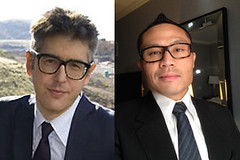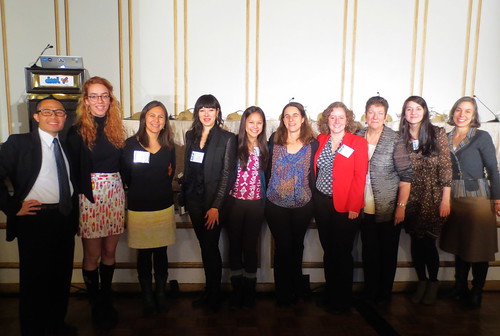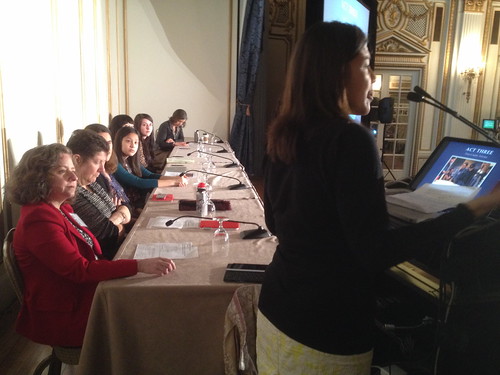This past weekend, I had the honor of MCing a fun panel discussion among educators in three locales in the US on the topic of fostering youth voice in local learning networks. If you are a local educator and looking for ways to better serve your youth community, I recommend that you check out the video of this session.
This session was part of the always amazing Digital Media and Learning conference , held this year in Boston from March 6-8, 2014.
 When we were planning this session, we were trying to find a way to break out of the typical panel discussion format. Our idea was to present it like a radio program, specifically "This American Life," as a means of telling a story in "three acts." And of course, as the only male in the planning group, I was tasked with playing the Ira Glass character. Ira is one of my idols, so it was awesome getting to play him in front of a live audience. I think I did a reasonably passable impression, although nowhere near as awesome as Fred Armisen.
When we were planning this session, we were trying to find a way to break out of the typical panel discussion format. Our idea was to present it like a radio program, specifically "This American Life," as a means of telling a story in "three acts." And of course, as the only male in the planning group, I was tasked with playing the Ira Glass character. Ira is one of my idols, so it was awesome getting to play him in front of a live audience. I think I did a reasonably passable impression, although nowhere near as awesome as Fred Armisen.
You can watch the results in the YouTube archive below. (Unfortunately, there was an audio glitch in the opening that doesn't get fixed until around the 8 minute mark.)
More notes after the jump….
)
The featured speakers in this session were:
- Morgan Anderson, Columbus Museum of Art
- Elizabeth Babcock, California Academy of Sciences
- Cathy Cormier, San Francisco Public Library
- Ingrid Dahl, Bay Area Video Coalition
- Elyse Eidman Aadahl, National Writing Project
- Amelia Marsh, Pima County, AZ, Youth
- Robin Mencher, KQED
- Jennifer Nichols, Pima County Public Library, AZ
- Rik Panganiban, California Academy of Sciences
- Emilie Robert Wong, San Francisco
Everyone did a fantastic job representing their own particular perspectives as learning lab / learning network innovators. But the biggest shout-outs to our two youth representatives on the panel, Amelia from Arizona and Emilie from San Francisco. They were incredibly well spoken and wise beyond their years. I expect big things from both of them!
I personally learned a lot about learning networks just from being on the panel. One big takeaway was that the main innovation from these learning labs is not the physical space that is created, although those are really awesome, it's the interinstitutional processes and relationships that are developed that foster powerful learning experiences for our young people. It's a kid in Columbus who can find a way to explore her passion for science, or a teen in Tucson who can connected with other kids who are interested in video production, or a young musician in the Bay Area who can find opportunities to perform, record and network.
At the same time, I found out that the work is long and difficult to create these networks. Issues of turf, trust, competing priorities, limited funding, and limited time all come into the mix. So it takes strong leadership and a commitment to openness and collaboration to navigate these together.
I also like that we got to open up the conversation at the end of the program to the entire audience. Everyone had a chance to share with their neighbor both opportunities and challenges serving their local youth. Then we asked people to share via an anonymous electronic poll what those opportunities and challenges were. Here's some of the best ones that people shared.
Local Opportunities to Serve Youth
-
our relationship with the school system
-
pockets across the university where we can discuss this and I have great colleagues in other departments
-
a thriving creative and technological community
-
a number of young professionals who are interested in giving back and that are supported by their companies
Major Challenges Serving Youth
-
Do we go for the low hanging fruit, or toward the most needy community?
-
finding ways to connect with teachers/schools
-
Getting youth in the door, and knowing what they want.
-
The biggest challenge has been funding, space, and staff.
- Reconciling youth and collaborator schedules with the interest-driven and inherently flexible nature of our youth programs.
-
Finding youth that can connect consistently
-
Creating a culture of support without paying either the youths or professional volunteers.
There are of course many more points that were made on the panel and in the discussions. But this gives you a flavor of what was covered on this session on Connected Learning at the DML conference this past weekend. I'm looking forward to continuing the conversation and being even more inspired by what local learning labs are doing around the US!

